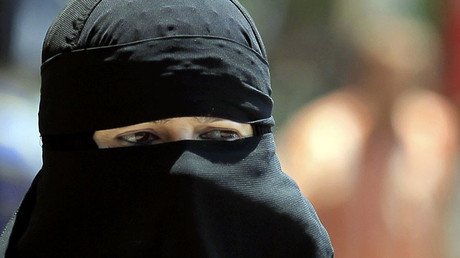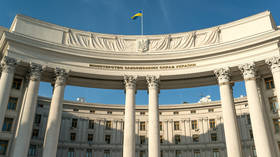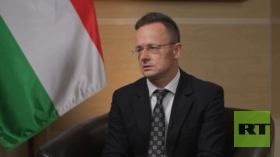‘Religiously neutral’: German parliament approves partial ban on full-face veil

German MPs have approved a partial ban on full-face veils, saying it’s the country’s duty to present itself “in an ideologically and religiously neutral manner.” The ban will apply to public servants and military personnel, but there are some exemptions.
The legislation was passed by the Bundestag, Germany’s parliament, on Thursday evening.
“The state has a duty to present itself in an ideologically and religiously neutral manner,” the text of the law states, as cited by AFP.
The ban applies to public servants, including election officials, as well as military personnel and staff working in the judiciary.
“[The ban] obliges officials and soldiers not to hide their faces while performing their duties or during direct fulfillment of their tasks,” a statement on the Bundestag’s website says.
However, the legislation does contain some exceptions. For example, military personnel and public servants may wear a full-face veil to protect themselves from infections. Police officers can also cover their faces in order to conceal their identity.
The new legislation also brings changes to existing laws concerning IDs.
“According to [the new bill], a person who presents their ID should be identified by matching their face with the [ID] photo”
German Interior Minister Thomas de Maiziere said, if migrants are to be socially integrated, it is essential that the country “makes clear and communicates [its] values and the limits of [its] tolerance to other cultures.”
Islamic head and face coverings have long been controversial in Europe, where they are often seen as incompatible with secular values. In 2011, France was the first European country to impose a ban on full-face coverings. Belgium soon followed suit.
Apart from the legislation on veils, the Bundestag also introduced a package of fresh security measures, one of which would allow authorities to put electronic bracelets on people considered a security threat, if approved by a judge.
Another states that Germany will implement EU rules requiring an inter-country exchange of information on flight passengers.
READ MORE: 'Islamist terrorist attacks in Germany possible any moment’ – German intelligence chief
The partial ban on full-face veils and new security measures were passed as Germany is still reeling from a spate of recent terrorist attacks.
German bus driver faces €10K fine for refusing to transport niqab-wearing Muslim woman https://t.co/M4HgH26sMipic.twitter.com/KyXLpdlHyN
— RT (@RT_com) April 14, 2017
In December of 2016, a man drove a stolen truck into a Christmas market in central Berlin, killing 12 people and injuring dozens. The attacker was identified as Anis Amri, a failed asylum seeker from Tunisia who had reportedly pledged allegiance to Islamic State (IS, formerly ISIS/ISIL). He was shot in Milan a few days later.
Germany saw a wave of smaller terrorist attacks last summer. In July, a rejected asylum seeker blew himself up outside a wine bar near a music festival in the German town of Ansbach, injuring 15 people.
The same month, a 17-year-old Afghan refugee shouting, “Allahu Akbar” attacked passengers on a train in Wuerzburg, wounding five people. The attacker was shot dead by police, who later found a hand printed IS flag in his room.
According to Eurostat figures from Wednesday, “the highest number of persons granted protection status” in 2016 registered in Germany (445,210).
“More than 60% of positive decisions granted in one single Member State: Germany,” Eurostat report stated.













